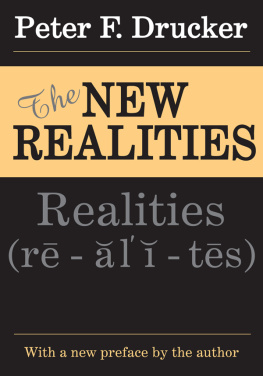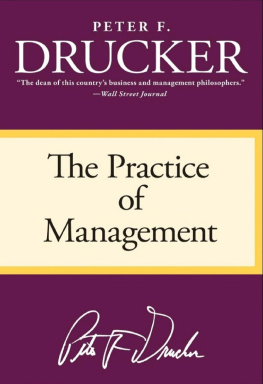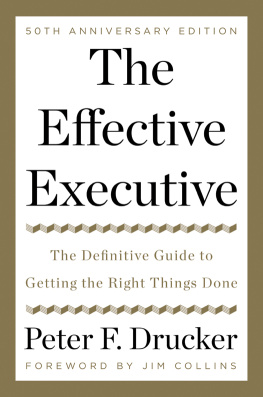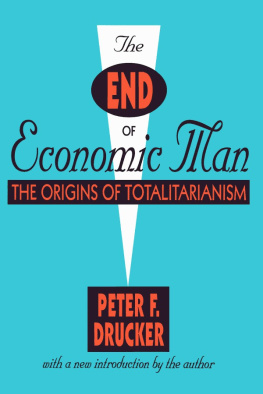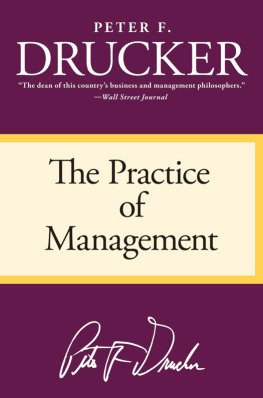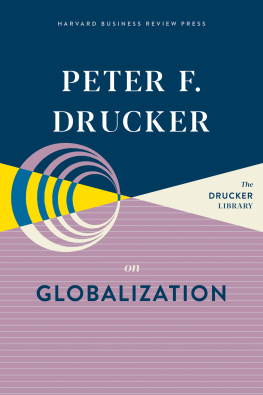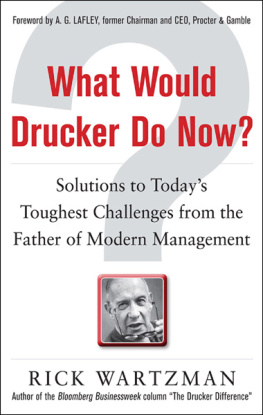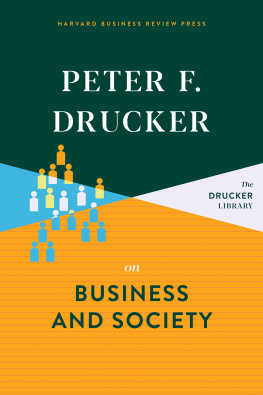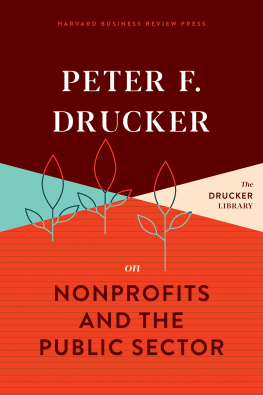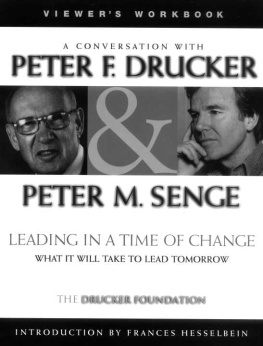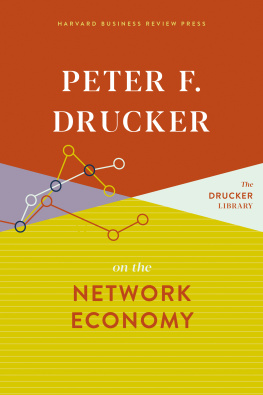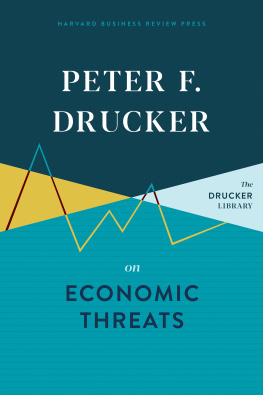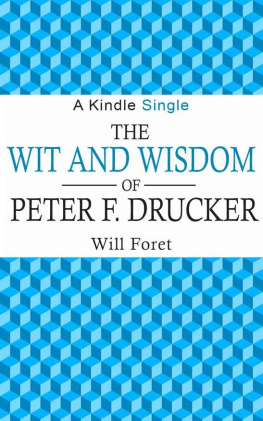THENEW
REALITIES
Transaction Books by Peter F. Drucker
Adventures of a Bystander
The Age of Discontinuity
Concept of the Corporation
The Ecological Vision
The End of Economic Man
A Functioning Society
The Future of Industrial Man
Landmarks of Tomorrow
The New Realities
The New Society
The Pension Fund Revolution
THE NEW
REALITIES
Peter F. Drucker
With a new preface by the author
Originally published in 1989 by Heinemann Professional Publishing Ltd.
Published 2003 by Transaction Publishers
Published 2017 by Routledge
2 Park Square, Milton Park, Abingdon, Oxon OX14 4RN
711 Third Avenue, New York, NY 10017, USA
Routledge is an imprint of the Taylor & Francis Group, an informa business
New material this edition copyright 2003 by Taylor & Francis.
All rights reserved. No part of this book may be reprinted or reproduced or utilised in any form or by any electronic, mechanical, or other means, now known or hereafter invented, including photocopying and recording, or in any information storage or retrieval system, without permission in writing from the publishers.
Notice:
Product or corporate names may be trademarks or registered trademarks, and are used only for identification and explanation without intent to infringe.
Library of Congress Catalog Number: 2003042602
Library of Congress Cataloging-in-Publication Data
Drucker, Peter Ferdinand, 1909-
The new realities / Peter F. Drucker, with a new preface by the author.
p. cm.
Originally published: London : Heinemann Professional Pub., 1989.
ISBN 0-7658-0533-2 (pbk. : alk. paper)
1. World politics________ 1985-1995. 2. Economic history-1971-1990. 3. Information society. I. Title.
D849.82.D78 2003
909.8dc21
2003042602
ISBN 13: 978-0-7658-0533-1 (pbk)
To my grandchildren:
Nova, Marin, Jeremy, Miya, Keith and Allison
Contents
Preface to the
Transaction Edition
When this book first came out in the summer of 1989, it received a great deal of attention - but for the wrong reasons. Practically every reviewer - outside even more than inside the United States - focused on only one small chapter of the book, the chapter entitled "When the Russian Empire is Gone." And practically every reviewer thought the title sheer nonsense - and even more so the statement in that chapter that the Soviet Empire was already falling apart. Dr. Henry Kissinger, for instance, wrote: "Drucker must have gone insane." Two years later, in 1991, the Soviet Empire was no more. And it had been destroyed, as the book clearly saw, by non-Russian nationalism in the Empire: in the Baltic Republics, the Ukraine, the Caucasian regions, and the various nationalities in Asia.
Even the reviewers who wrote laudatory reviews of the book treated it as a book about the future, that is, a book of forecasts. Yet, as the title itself makes clear, none of the topics discussed in this book were "forecasts" or "predictions." They all described realities.
Underlying this book and all its chapters is the realization that the key issues of the next thirty or forty years - maybe even further out - have already been largely defined by the events of the last half-century. The key lesson this book tries to get across is that decision-makers - in government, in the universities, in business, in the labor unions, in churches - need to factor into their present-day decisions the future that has already happened. For this, they need to know what events have already occurred that do not fit into their present-day assumptions, and thereby create new realities.
Intellectuals and scholars tend to believe that ideas come first which then lead to new political, social, economic, psychological realities. This does happen, but it is the exception. As a rule, theory does not precede practice. Its role is to structure and codify already proven practice. Its role is to convert the isolated and "atypical" from exception to "rule" and "system," and therewith into something that can be learned and taught, and, above all, into something that can be generally applied. Theory organizes the new realities; it rarely creates them.
This book was written and published well before the information boom of the 1990s. Information is not just a technology - any more than Watt's steam engine was just a technology. It is an organizing principle. The information boom was bound to collapse. For it treated information very much as a conventional technology. But it is as different from conventional technology as Watt's steam engine 250 years ago was from traditional sources of mechanical power (which his dozens of imitators failed to understand - probably the main reason why none succeeded). The technologies that dominated from Watt's day in the 1760s until the recent decades were all based on what this book, in its Conclusion, calls "conceptions." Information is "perception." In information the individual "bit" has no existence except in contemplation of the whole. This is the fundamental - and the permanent - new feature of the "Information Revolution."
It is much too early to analyze the full meaning of this change. And I certainly would not be competent to do so. After all, it took a full hundred years (until 1781) to think through the meaning of the intellectual revolution that Descartes and Newton had brought about in the seventeenth century. And then it took an Immanuel Kant (1724-1804), the greatest thinker of the Modern Age, to do the job.
This is altogether not a philosophical book. It is a book for decision-makers and those aspiring to become decision-makers.
Far too many of them - maybe a majority - base their decisions still on yesterday's realities. One example: books and university courses still assume - if only subconsciously - that the blue-collar, manual worker on the assembly line is the key "human resource." In the developed countries the blue-collar manual worker in the factory has become a small minority. The rapidly growing "knowledge technologists" are the new and very different key work force. Decisions made on the assumption that the core of the work force are manual factory workers are simply the wrong decisions for a work force of knowledge technologists.
This book does not pretend to give "answers." But it tries to make the decision-makers of the information-based knowledge-organizations of twenty-first-century society ask the right questions.
Peter F. Drucker
Claremont, California
Spring 2003
This book is not about 'things to come'. It is not about the 'next century'. Its thesis is that the 'next century' is already here, indeed that we are well advanced into it. We do not know the answers. But we do know the issues. The courses of action open to us can be discerned. And so can those which, however popular, will be futile, if not counterproductive. The realities are different from the issues on which politicians, economists, scholars, businessmen, union leaders, still fix their attention, still write books, still make speeches. The convincing proof of this is the profound sense of unreality which characterizes so much of today's politics and of today's economics. And thus, while this book is not 'futurism', it attempts to define the concerns, the issues, the controversies that will be realities


